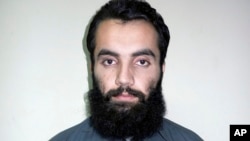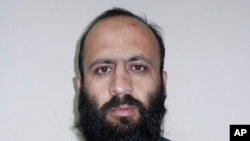Afghanistan’s spy agency announced Thursday it has captured two key commanders of the feared Haqqani Network, which is fighting the U.S.-led coalition forces alongside the Taliban. The detainees include a son of Jalaluddin Haqqani, the founder of the insurgent group that U.S. and Afghan authorities believe operates from bases in neighboring Pakistan.
Afghan authorities have identified the two men as Anas Haqqani and Hafiz Rashid, describing their capture as a blow to the Haqqani Network’s operational and fighting capabilities.
A spokesman for Afghanistan’s National Directorate of Security, Abdul Haseeb Sediqi, says the arrests were made on Tuesday in Khost province near the Pakistani border. He added that Anas Haqqani was playing a powerful role as the deputy of his brother Sirajuddin Haqqani, who is the leader of the network.
The spokesman says Anas Haqqani “was directly involved in operational and strategic decisions of the network, and ran its fundraising campaign” in Gulf countries, besides overseeing its social media propaganda activities using his “special computer skills.”
The other captured militant, Rashid, is said to be the group’s military commander for Kabul and southeastern Afghanistan. Sediqi alleged that the militant commander was until recently living in Pakistan’s Punjab province.
He says that Rashid was responsible for identifying the targets for suicide bombers and providing them with logistical support and equipment to carry out suicide attacks in Kabul and eastern Afghan provinces.
The Afghan spy agency spokesman went on to allege that 34-year-old Rashid was training and transferring suicide bombers to Afghanistan from the Haqqani Network’s camps in the Pakistani city of Peshawar and the Waziristan border region.
Militant sources claim the arrests were made by local authorities in the Gulf state of Qatar who later handed the men over to Afghanistan.
The network’s founder, Jalaluddin Haqqani, is a former anti-Soviet guerrilla commander and is said to have sidelined himself from operational affairs because of deteriorating health.
One of his sons, Nasiruddin Haqqani, was shot dead by unknown assailants in November near Islamabad. He was serving as the network’s chief financier. Another son, Badruddin Haqqani, was killed in a U.S. drone strike in North Waziristan in August of 2012.
Haqqani sanctuaries in North Waziristan have long strained Islamabad's relations with Kabul and Washington.
Speaking this week at the Atlantic Council in Washington, U.S. special representative for Afghanistan and Pakistan Dan Feldman reiterated the significance of Pakistan's counterterrorism offensive in Waziristan.
"The operations clearly disrupted militant activities, but the job is not done. Militant groups, including the Haqqani Network and the Pakistani Taliban, continue to pose a threat to Pakistan, Pakistan's neighbors, and the U.S. It is vital that these operations continue and that every effort is made to prevent the safe havens from being reconstituted," said Feldman.
The al-Qaida-linked Haqqani Network is blamed for staging some of the deadliest attacks against NATO and Afghan targets from its bases in Pakistan’s North Waziristan border region.





